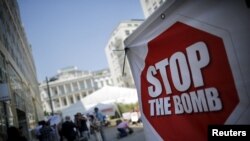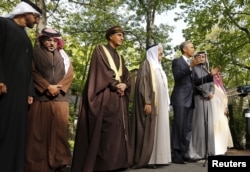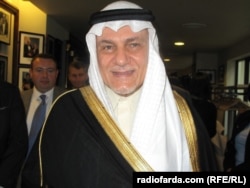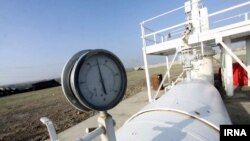The historic deal between Iran and world powers reportedly reached on July 14 in Vienna has paved the way for international sanctions against Tehran to be lifted in exchange for limits on its nuclear activities. While the six powers have said the deal will slow Tehran’s ability to acquire a nuclear weapon, the accord could also have other far-reaching ramifications linked to Iran’s possible reintegration into the global community.
From potentially stoking a Middle East arms race, to enabling political reforms in Iran, to undercutting Russia’s energy might by freeing up massive oil and gas supplies, here are some possible implications of the agreement.
‘Destabilizing’ Factor?
The prospect of a prospering Iran has sparked concern among skeptics of the nuclear deal -- and even some U.S. officials who back it -- that Tehran could use this financial windfall to destabilize the already volatile Middle East. Sanctions relief could allow Iran to repatriate more than $100 billion in oil revenues currently frozen overseas , and some experts estimate that sanctions relief could help Iran’s $420 billion economy grow by 5 percent to 8 percent annually.
“We are, of course, aware and concerned that, despite the massive domestic spending needs facing Iran, some of the resulting sanctions relief could be used by Iran to fund destabilizing actions,” The Daily Beast quoted a U.S. State Department official as saying in a July 8 report.
However, Mohsen Milani, the executive director of the Center for Strategic & Diplomatic Studies at the University of South Florida, told RFE/RL that the deal could be a “transformative event” in the Middle East because it opens the door to better ties between Iran and the West, which could reduce tension in the region.
Richard Nephew, who served as the State Department’s principal deputy coordinator for sanctions policy and as director for Iran at the National Security Council, argues that fears that Iran will use money from sanctions relief to bankroll its regional ambitions are overblown.
"Iran’s domestic economic needs are real, as is [President Hassan Rohani’s] imperative to deliver on the promises that got him elected,” Nephew wrote earlier this month. “To ensure the stability of their government, Iran’s leaders must tend to the problems at home and make the investments necessary to sustain their future. Supporting Syrian President Bashar al-Assad and other regional actors is an important, but secondary, objective."
Shifting Alliances
The U.S. push for the nuclear deal with Iran has also raised fears among Sunni-dominated Arab states that Washington, their traditional guarantor, is essentially stepping back to allow Shi’ite Iran free rein in the region. Amid these concerns, Gulf Arab states are increasingly talking about diversifying their international alliances.
"[U.S. President Barack] Obama is going to be remembered as the U.S. president who restored relations with Iran. But he may also be remembered as the U.S. president who lost his traditional allies in the region," Sami al-Faraj, a Kuwaiti security adviser to the Gulf Cooperation Council (GCC), told Reuters in June.
The GCC -- consisting of Saudi Arabia, Kuwait, Bahrain, Qatar, the United Arab Emirates, and Oman -- has “been looking for other options, whether it is Russia, France, or regional powers like Turkey and Pakistan, to enable us to regain a balance of power,” Faraj told Reuters.
Saudi Arabia’s sovereign wealth fund announced earlier this month that it had agreed to invest $10 billion in Russia despite Moscow’s support for Syria’s Assad, which has angered Riyadh.
Saudi Arabia is also building closer ties with France. Riyadh and Paris in late June announced they were undertaking a feasibility study for the construction of two nuclear reactors in Saudi Arabia. The reactors would be slated for civilian use, and a Saudi official told AFP that the kingdom "won't take the risk" of pursuing the development of a nuclear weapon.
Regional Arms Race
The Saudi official’s statement to AFP on the peaceful nature of its nuclear plans follows numerous suggestions by Saudi Arabia in recent months that the Iran deal could force Riyadh to pursue enrichment capabilities equal to those possessed by Iran. These comments have raised the specter of a possible race for nuclear arms in a region that is already a tinderbox.
“We can’t sit back and be nowhere as Iran is allowed to retain much of its capability and amass its research,” one Arab leader was quoted by The New York Times as saying in May.
Prince Turki al-Faisal, a member of the Saudi royal family and the country's former intelligence chief, hinted in an interview with the BBC earlier this year that other governments in the Middle East would seek the same. "If Iran has the ability to enrich uranium to whatever level, it's not just Saudi Arabia that's going to ask for that,” he said.
Milani, a professor of politics at the University of South Florida, cast doubt on threats by the Saudis and other Middle East governments to pursue nuclear capabilities, calling them efforts to pressure the West to get as many concessions as it can from Iran.
“It’s much easier said than done. Is Saudi Arabia prepared to pay the same heavy price Iran has paid to get to where it is today in its nuclear program? And Saudis should understand that the very countries that were supporting them when six global powers were negotiating with Iran, including Israel, will become their greatest enemy if they decide to buy a bomb or even develop the indigenous capability to build a nuclear bomb,” Milani told RFE/RL.
A New Energy Game
Iran's international isolation has prevented it from fully capitalizing on its enormous energy reserves. This could change with the possible lifting of international sanctions by giving Tehran new energy customers and access to foreign investment to develop its oil and gas fields. Iran has the world’s fourth-largest proven oil reserves, with 157 billion barrels, and 34 trillion cubic meters of proven natural gas reserves, placing it ahead of Russia in both categories, according to the latest BP Statistical Review of World Energy.
Unleashing these reserves on world markets would not only boost Tehran’s coffers, but also provide European countries a possible alternative to Russian gas. The EU obtains 27 percent of its gas from Russia’s state-owned energy giant Gazprom. Most of this gas is transported through Ukraine, where Kyiv and Western governments say Russia has given direct military backing to separatists in a deadly conflict that erupted in April 2014 following Moscow’s annexation of Crimea. Russia also relies heavily on oil revenues to keep its economy churning and -- already hit by last year’s steep decline in oil prices -- could suffer further should Iranian supplies hit the market.
The United States and the EU have sought to weaken Moscow’s resolve in the Ukraine conflict by punishing the Kremlin with economic sanctions.
'Road To Democratization'
A nuclear deal could give the relatively moderate Rohani and his allies leverage over hard-line members of the ruling establishment who oppose attempts to give Iranians more freedom. But he could also face increased pressure from his domestic opponents, according to Alireza Nader, a senior Iran analyst with the Rand Corporation.
“A nuclear deal will undoubtedly boost President Rohani and provide him a lot of political capital. What the conservatives fear is Rohani using his popularity to enact major changes in Iran,” Nader told RFE/RL.
So far, Rohani has been very cautious, Nader added.
“But will his calculation change after a nuclear deal? While he may get a big boost from a nuclear accord, he still faces a political system largely controlled by conservatives. They are likely to push back hard against any attempts at reform, no matter how small,” he said.
Nevertheless, some observers believe having a deal in place improves the prospects of democratic reforms inside the country by removing sanctions and the threat of war, and by giving moderates and pro-reform Iranians more breathing space.
Among them is University of Denver Professor Nader Hashemi, who served as the lead sanctions expert for the U.S. team negotiating with Iran. In a recent essay, Hashemi argued that a nuclear agreement “could help put Iran back on the road to democratization.”













